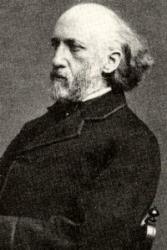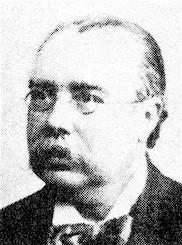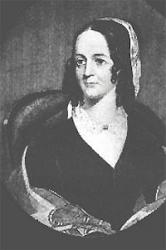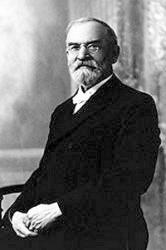Planning worship?
Check out our sister site, ZeteoSearch.org,
for 20+ additional resources related to your search.
- |
User Links
Person Results
‹ Return to hymnal




Export as CSV
Charles Beecher

1815 - 1900 Hymnal Number: d284 Author of "We are on our journey home, Where Christ our Lord" in The Sabbath Chimes Beecher, Charles, son of the well-known Dr. Lyman Beecher, whose autobiography he chiefly edited, and brother of Henry Ward Beecher, was born at Litchfield, Connecticut, 1815. Mr. Beecher was for some time a Congregational pastor at Georgetown, Mass. He has published Review of Spiritual Manifestations, 1853; Pen Pictures of the Bible, 1855, &c. His hymns were contributed to his brother's Plymouth Collection, 1855, and include:—
1. There's rest in the grave. Heaven.
2. We are on our journey home. Heaven.
The latter is in the more extensive use, but both are unknown to the English collections. [Rev. F. M. Bird, M.A.]
-- John Julian, Dictionary of Hymnology (1907)
Charles Beecher
J. W. Dadmun
1819 - 1890 Hymnal Number: d323 Author of "Where'er we meet, you always say" in The Sabbath Chimes Rv John William Dadmun USA 1819-1890. Born at Cambridge, MA, he completed his education at the Wesleyan Academy, Wilbraham, MA. At 22 he joined the New England Methodist Conference and pastored churches in the towns of Ludlow, Southhampton, South Hadley Falls, Enfield, Ware, Monson, Ipswich, and Lowell, the first Methodist Church and Grace Church, Boston and First Church, Boston Highlands. For a number of years he was also prison Chaplain and Superintendent of schools in the city institutions of Boston at Deer Island, off the coast of Maine. He married Lucy Ann Dutton, and they had seven children: Lucy, Wiletta, Francina, Charles,William and two others. He was initiated into Masonry at the Mt. Lebanon Lodge in Boston, MA, and served as Grand Chaplain and District Deputy Grand Master, which he immensely enjoyed. He rose in ranks within the organization and was instrumental in forming the Mt. Vernon Chapter in Roxbury, MA. He was elected Grand High Priest of the Grand Chapter of MA. He was Knighted into the De Molay Commandery in Boston, serving several years and rising to Grand Prelate of MA & RI, and attained to a number of other significant positions within the Masons. In later years, after Lucy died, he married Martha Jane Rogers. He collected songs and contributed lyrics to some, publishing a number of song books: “Army & Navy melodies” (1862), “The Melodian” (1862), “Revival melodies” , “The Eolian harp” (1860), “The sacred harmonium”, “new revival melodies”, “Musical string of pearls”, The Masonic choir” (1864), “The humming bird”, “Union league melodies”, “The new golden chain of Sabbath school melodies”, “The olive leaf”, “The timbrel” (1866), and others. Copies of these works have been sold around the world. He died at Boston, MA.
John Perry
J. W. Dadmun
Anne Houlditch Shepherd
1809 - 1857 Hymnal Number: d14 Author of "A holy happy band" in The Sabbath Chimes Shepherd, Anne, née Houlditch, daughter of the Rev. E. H. Houlditch, sometime Rector of Speen, Berkshire, was born at Cowes, Isle of Wight, Sept. 11, 1809; married to Mr. S. Saville Shepherd in 1843; and died at Blackheath, Kent, Jan. 7, 1857. Her Hymns adapted to the Comprehension of Young Minds were published (3rd ed. 1847 5th ed. 1855), and contained 64 hymns. Of these the following have come into common use:—
1. Around the throne of God in heaven.
2. Glory to Jesus, glory. Praise.
3. Here's a message of love. Invitation.
4. I have read of the Saviour's love. The Love of Christ.
5. See where the gentle Jesus reigns. Jesus, the Children's Friend.
Of these hymns the first has by far the widest acceptance, and is found in a large number of children's hymn-books. Her religious novels, Ellen Seymour, 1848; and Reality, 1852, attracted some attention.
--John Julian, Dictionary of Hymnology (1907)
Anne Houlditch Shepherd
Sidney Dyer
1814 - 1898 Hymnal Number: d103 Author of "How blest are we" in The Sabbath Chimes Dyer, Sidney, who served in the U. S. Army from 1831 to c. 1840, is a native of White Creek, Washington County, New York, where he was born in 1814. On leaving the army he was ordained a Baptist Minister in 1842, and acted first as a Missionary to the Choctaws, then as Pastor in Indianapolis, Indiana (1852), and as Secretary to the Baptist Publication Society, Phila. (1859). He has published sundry works, and in the Southwestern Psalmist, 1851, 16 of his hymns are found.
The following are later and undated:—
1. Go, preach the blest salvation. Missions. In the Baptist Praise Book, 1871, and The Baptist Hymn & Tune Book, 1871.
2. Great Framer [Maker] of unnumbered worlds. National Humiliation. In the Boston Unitarian Hymn [and Tune] Book, 1868, and others.
3. When faint and weary toiling. Work whilst it is day. In the Baptist Praise Book, 1871.
4. Work, for the night is coming. Duty. This hymn is in wider use than the foregoing, but though often ascribed to Dyer, is really by Miss Anna L. Walker, of Canada, who published a volume of Poems, 1868. S. Dyer, in 1854, wrote a hymn on the same subject for a Sunday-school in Indianapolis, and hence the confusion between the two. In 1882 a cento beginning with the same stanza was given in Whiting's (English) Hymns for the Church Catholic, No. 366. Of this cento, stanzas i., ii. are by Miss Walker; and stanzas iii., iv. by Miss Whiting, daughter of the editor of that collection. [Rev.F. M. Bird, M.A.]
-- John Julian, Dictionary of Hymnology (1907)
==================
Dyer, S., p. 317, ii. Additional hymns by Dr. Dyer are given in the Baptist Sursum Corda, Phila., 1898, with the following dates :—
1. Enter, Jesus bids thee welcome. Invitation. 1883.
2. No more with horrors veil the tomb. Burial. 1897.
Dr. Dyer d. in 1898.
--John Julian, Dictionary of Hymnology, New Supplement (1907)
=================
Dyer, Sidney. (White Creek, New York, February 11, 1814--December 22, 1898, Philadelphia). Baptist. Indiana State University, honorary A.M. ; Bucknell University, honorary Ph.D. Missionary to the Choctaws early in his career. Pastorates at Brownsville, New York, 1842; Indianapolis, 1852-1859. District secretary of the American Baptist Publication Society, Philadelphia, 1859-1885. Author of eight religious books designed for children, two volumes of verse: Voices of Nature (Louisville, 1849), and Songs and Ballads (Indianapolis, 1857). Wrote a large number of hymns in Sunday School as well as church collections. In 1851, he published The South Western Psalmist (Louisville), which became known as Dyer's Psalmist. Of 467 hymns, 16 are by Dyer. Also wrote a prize-winning hymn "O wondrous land! thy onward march sublime" for the Jubilee of the American Baptist Home Mission Society which was help in New York in 1882. This 66-stanza hymn may be found in Baptist Home Missions in North America: Including a Full Report of the Proceedings and Address of the Jubilee Meeting . . . (New York: Baptist Home Mission Rooms, 1883). "Work, for the night is coming," written by Annie L. (Walker) Coghill, was sometimes ascribed to Dyer. The confusion arose when, in 1854, Dyer wrote a text on the same subject for a Sunday School in Indianapolis.
--Deborah Carlton Loftis, DNAH Archives
Sidney Dyer
R. G. Staples
b. 1833 Hymnal Number: d278 Author of "To thee in each [youth's] bright morning" in The Sabbath Chimes Robert Griffin Staples. He was born Robert Griffin on January 24, 1833 in Washington DC. Both of his parents died in a carriage accident when he was an infant; he was then adopted by his mother's sister, Mary Ann King, and her husband, Samuel Johnson Staples and he was given the name Robert Griffin Staples. He was a captain in the Union Army during the Civil War and after the war was promoted to Major. He then worked as chief clerk in the Portsmouth United States Navy Yard. Religion was an important part of his life, as well as music. He died June 20, 1891 in Portsmouth, VA.
Dianne Shapiro, from Jean Brickey (great-granddaughter)
R. G. Staples
John King

1789 - 1858 Hymnal Number: d311 Author of "Shall we only render Words" in The Sabbath Chimes In H. and J. Gwyther's Psalmist, A Selection. of Psalms & Hymns, etc., Lond., 1830, there is 1 psalm version signed “J. King," and 1 psalm version and 4 hymns signed "I. King." One of the latter is "When His salvation bringing," No. 417, in 3 stanzas of 8 lines, with a chorus. This hymn is in extensive modern use. Concerning the author great, difficulty has been experienced in tracing his identity. Under date of Aug. 15, 1865, the Rev. John Gwyther informed D. Sedgwick that the signatures stood for "Joshua King, late Vicar of Hull."
In a second communication, dated Aug. 19, 1865, be writes further, "Mr. Joshua King was Curate to Mr. J. Eyton, of Wellington, Shropshire, when Mr. E. made his collection of Hymns and wrote them for his Book, but whether he published them in any other form I don't know. Mr. K. gave his Hymn Book to my brother." From the Registers of Eyton Church we find that Mr. King's name was John. He graduated at Queen's College, Cambridge, B.A. 1814; became Incumbent of Christ Church, Hull, in 1822, and died Sep. 12, 1858, aged 69.
--John Julian, Dictionary of Hymnology, Appendix, Part II (1907)
See also Joshua King.
John King
Sarah Josepha Buell Hale

1788 - 1879 Person Name: Sarah J. Hale Hymnal Number: d211 Author of "The Lord's prayer" in The Sabbath Chimes Hale, Sarah Josepha, née Buell, born at Newport, New Hampshire, 1795, and married to David Hale, a lawyer, who died in 1822. Mrs. Hale edited The Ladies' Magazine, Boston, from 1828; and Godey's Ladies’ Book, Philadelphia, from 1837, besides publishing several works. Her hymn, “Our Father in heaven, we hallow Thy name" (The Lord's Prayer), appeared in Mason & Greene's Church Psalmody, 1831, No. 553, in 2 stanzas of 8 lines. Mrs. Hale, who was a member of the Protestant Episcopal Church, died in 1879. [Rev. F. M. Bird, M.A.]
--John Julian, Dictionary of Hymnology (1907)
Sarah Josepha Buell Hale
David Denham
1791 - 1848 Hymnal Number: d170 Author of "Mid [midst] scenes of confusion and creature complaints" in The Sabbath Chimes Denham, David, born 1791, was the son of Thos. Denham, a Baptist minister in the East of London. He began to preach when very young, and in 1810 became pastor of the Baptist Church at Horsell Common. In 1816 removed to Plymouth, in 1826 to Margate, and in 1834 to the Baptist Church in Unicorn Yard, Tooley Street, Southward. Ill-health compelled him to resign his charge in London, and he sojourned for a time at Cheltenham and Oxford. He died in 1848 at Yeovil, in Somerset, and was buried in Bunhill Fields Burial Ground, London.
In 1837 he published a collection of hymns, as:—
The Saints' Melody. A New Selection of upwards of One Thousand Hymns, Founded upon the Doctrines of Distinguishing Grace, and adapted to every part of the Christian's experience and devotion in the Ordinances of Christ, &c, 1837. This edition contained 1026 hymns. This number was subsequently increased to 1145 hymns.
This Selection is still in common use in more than one hundred congregations in Great Britain and the colonies. Denham's hymns, all of which are signed "D. Denham," are numerous. There is also one, apparently by his wife, "Mrs. M. A. Denham." Outside of his own Selection his hymns are rarely found. The best known is "'Mid scenes of confusion and creature complaints." [Rev. W. R. Stevenson, M.A.]
-- John Julian, Dictionary of Hymnology (1907)
David Denham
William Fairfield Warren

1833 - 1929 Person Name: W. F. Warren Hymnal Number: d212 Author of "Homeward bound" in The Sabbath Chimes Warren, William Fairfield, D.D., was born at Williamsburg, Massachusetts, in 1833, and graduated at the Wesleyan University in 1853. After spending some time in Germany, he was appointed Professor of Systematic Theology in the Methodist Episcopal Mission Institute at Bremen, in 1861. Returning to America in 1866, he held some important appointments there, ultimately becoming President of Boston University, in 1873. His hymn, "I worship Thee, O Holy Ghost" (Whitsuntide), was contributed to the American Methodist Episcopal Hymnal, at the request of the editorial committee, in 1877, and was published therein in 1878. It has passed into other collections.
-- John Julian, Dictionary of Hymnology (1907)
==========================
Warren, William, D.D. (Williamsburg, Massachusetts, March 13, 1833--December 6, 1929). He prepared for college at East Greenwich Academy, graduated A.B., Wesleyan University, took training at Andover Theological Seminary, and continued his studies at the Universities of Berlin and Halle. He was the recipient of honorary degrees from Boston, Wesleyan, and Ohio Wesleyan Universities. Ordained a Methodist Episcopal minister in 1855, after preaching in Boston for five years he returned to Germany where for a like term of years he was Professor of Systematic Theology at Mission Institute, Bremen, which later became Martin Institute at Frankfort. He returned to Boston to occupy a similar professorship at the Theological Seminary and to become Acting President when the Methodist Biblical Institute moved there from Concord, New Hampshire. His return gave impetus to the plan under way which eventuated the establishment of Boston University in 1869. Becoming President of the University in 1873, he was Dean of its School of Theology, 1903-1911, and made President Emeritus in 1923.
--Robert G. McCutchan, DNAH Archives
William Fairfield Warren
Edwin H. Nevin
1814 - 1889 Person Name: Edwin Henry Nevin Hymnal Number: d82 Author of "Happy, Savior, would [shall] [should] I [we] be" in The Sabbath Chimes Nevin, Edwin Henry, D.D., son of Major David Nevin, was born at Shippensburg, Pennsylvania, May 9, 1814. He graduated in Arts at Jefferson College, 1833; and in Theology at Princeton Seminary, in 1836. He held several pastorates as a Presbyterian Minister from 1836 to 1857; then as a Congregational Minister from 1857 to 1868; and then, after a rest of six years through ill health, as a Minister of the Reformed Church, first at Lancaster, Pennsylvania, and then in Philadelphia. Dr. Nevin is the author of several hymns, the more important of which are:—
1. Always with me [us], always with [us] me. Jesus always present.
2. Come up hither, come away. Invitation Heavenward.
3. Happy, Saviour, would I be. Trust. This is given in the Lyra Sacra Americana as "Saviour! happy should I be." This change was made by the editor "with the consent and approbation of the author."
4. 0 heaven, sweet heaven. Heaven. Written and published in 1862 after the death of a beloved son, which made heaven nearer and dearer from the conviction that now a member of his family was one of its inhabitants" (Schaff’s Christ in Song, 1870, p. 539).
5. Live on the field of battle. Duty. Appeared in the Baptist Devotional Hymn Book, 1864.
6. I have read of a world of beauty. Heaven.
7. Mount up on high! as if on eagle's wings. Divine Aspirations.
Of these hymns, Nos. 1, 2, 3 appeared in Nason's Congregational Hymn Book, 1857; and all, except No. 5, are in the Lyra Sacra Americana, 1868. [Rev. F.M. Bird, M.A.]
--John Julian, Dictionary of Hymnology (1907)
Edwin H. Nevin


 My Starred Hymns
My Starred Hymns


